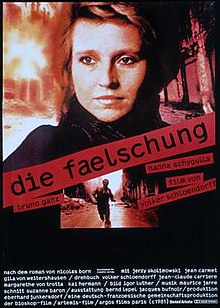Circle of Deceit (1981 film)
| Circle of Deceit | |
|---|---|
 | |
| Directed by | Volker Schlöndorff |
| Written by | Volker Schlöndorff Margarethe von Trotta Jean-Claude Carriere Kai Hermann |
| Based on | Die Fälschung by Nicolas Born |
| Produced by | Eberhard Junkersdorf Anatole Dauman |
| Starring | Bruno Ganz Hanna Schygulla Jerzy Skolimowski Gila von Weitershausen |
| Cinematography | Igor Luther |
| Edited by | Suzanne Baron |
| Music by | Maurice Jarre |
| Distributed by | United Artists Classics |
Release dates |
|
Running time | 110 minutes[1] |
| Countries | West Germany France Lebanon |
| Languages | German English French Arabic |
Circle of Deceit (German title: Die Fälschung, 'the deception'; French title: Le Faussaire) is an anti-war film[2] directed by Volker Schlöndorff and internationally released in 1981. An international co-production, it was an adaptation of Nicolas Born's novel The Deception, which had appeared in 1979. The film follows a German journalist sent to Beirut to report on the Lebanese Civil War, which had begun in 1975.
Cast
[edit]- Bruno Ganz as Georg Laschen
- Hanna Schygulla as Ariane Nassar
- Jerzy Skolimowski as Hoffmann
- Jean Carmet as Rudnik
- Gila von Weitershausen as Greta Laschen
- Khaled El Sayed as Progressive Officer (uncredited)
Plot
[edit]Journalist Georg Laschen is sent to Beirut to report on the Lebanese civil war.[3] His feelings about this mission are influenced by the dysfunctionality of his marriage to the unfaithful Greta, who resents his frequent absences for war reporting and remains in Germany with their young children,[3] and his lack of understanding of the conflict.[4][5]
He feels that his opinions and lack of understanding of events and their background[6] are not respected by his editors[7] because any conflict interests the public.[8] Consequently, he feels that his reports are not real journalism and pretending that they are is deceitful (or in German: Fälschung).
After an affair with a local named Arianna[9] (Hanna Schygulla), he happens to kill a man.[1] He realises how relatively easily one's moral standards can be corrupted in a violent environment and how hard or even impossible it is to remain unbiased[10] as a journalist.[11][12]
Production
[edit]The film was shot on location in Beirut.[2] The Lebanese Civil War, which began in 1975, would continue until 1990. The New York Times remarked that it was "filmed in 1980 under remarkable conditions: with its crew confined to "safe" portions of Beirut while the fighting went on elsewhere, but with ubiquitous evidence of real warfare everywhere."[13]
Reception
[edit]The New York Times described it as "a balanced, thoughtful, extremely moving vision of wartime tragedy."[13]
Awards
[edit]The film was nominated for the César Award for Best Foreign Film in 1981. Jerzy Skolimowski won the Best Supporting Actor Deutscher Filmpreis in 1982, for his role as the war photographer Hoffmann.
Discography
[edit]The original soundtrack music composed by Maurice Jarre for Le Faussaire was released on CD in 2013 by Canadian label Disques Cinemusique. More information here.[permanent dead link]
References
[edit]- ^ a b c "Die Fälschung". VolkerSchlöndorff.com. Archived from the original on March 23, 2012. Retrieved 2011-04-26.
- ^ a b "German Filmmakers and Movies". Goethe Institut. Retrieved 2011-04-26.
- ^ a b "Plot Summary for Die Fälschung". IMDb. Retrieved 2011-04-26.
- ^ "the film stands as an extraordinary accomplishment in the way it reveals the new types of warfare emerging in the world close-up, conflicts that journalists like Laschen and Hoffmann were unaccustomed to covering". Archived from the original on 2011-06-13. Retrieved 2011-04-26.
- ^ "But what you see is the bodycount". YouTube. Retrieved 2011-04-26.
- ^ "Der von seiner Todessehnsucht getriebene Laschen wird tagtäglich von der orientalischen Vielfalt des Landes überwältigt (Laschen, driven by his desire to die, is day by day overwhelmed by the oriental complexity of this country)". Retrieved 2011-04-26.[permanent dead link]
- ^ "Bruno Ganz plays a West German journalist whose frequent assignments to war-torn nations have left him jaundiced". Retrieved 2011-04-26.
- ^ "Movies such as the German Die Fälschung (1981) by Volker Schlöndorff show foreign correspondents who deal with doubts about their profession and the feeling that their work is only there to satisfy the reader's addiction to catastrophes and sensations" (PDF). Retrieved 2011-04-26.
- ^ "He also finds another kind of danger, an affair with a beautiful widow (Hanna Schygulla)". Archived from the original on 2011-07-24. Retrieved 2011-04-26.
- ^ "In Beirut, listening to correspondents discussing the war, Laschen measures their prejudices against his own pro-Palestinian bias". Retrieved 2011-04-26.
- ^ "Probing an ethical minefield of journalism, exploitation, war, and murder, Circle of Deceit is hauntingly compassionate, shockingly realistic". Retrieved 2011-04-26.
- ^ "Disgusted by his editors' enthusiasm to exploit Beirut's agony, he quits, as a good rebel should". Retrieved 2011-04-26.
- ^ a b Janet Maslin, The New York Times, 11 February 1982, Circle of Deceit (1981): 'CIRCLE OF DECEIT,' WAR CORRESPONDENT IN BEIRUT
External links
[edit]- 1981 films
- 1980s war drama films
- Anti-war films
- Films about journalists
- Films about war correspondents
- Films based on German novels
- Films directed by Volker Schlöndorff
- French war drama films
- German war drama films
- 1980s German-language films
- Lebanese drama films
- Lebanese Civil War films
- West German films
- Films produced by Anatole Dauman
- 1980s political drama films
- 1981 drama films
- 1980s French films
- 1980s German films
- German-language war films
